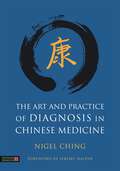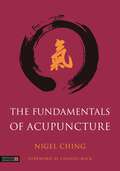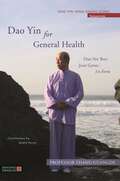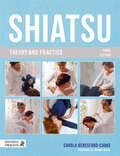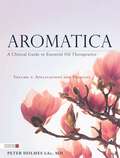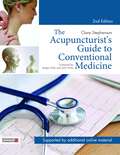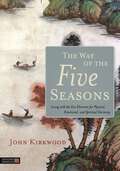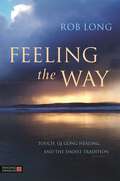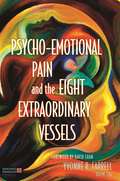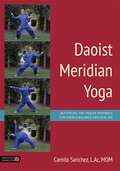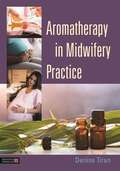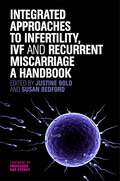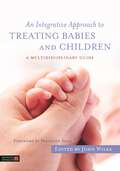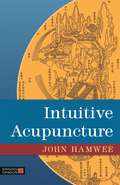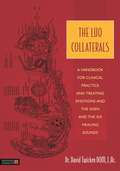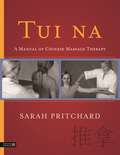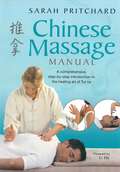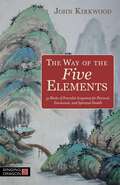- Table View
- List View
The Art and Practice of Diagnosis in Chinese Medicine
by Nigel Ching Jeremy HalpinThis textbook on diagnosis in Chinese medicine is unique in its clarity and accessibility. Divided into two sections, it is a comprehensive diagnostic manual. The first section explains how to collect and collate the information required to formulate a diagnosis and is divided into four approaches: visual, palpation, interrogation and listening/smelling. The second section describes the various diagnostic models in Chinese medicine, including The Eight Principles; zangfu organ pattern; the Six stages, four levels and san jiao; the twelve regular channels and eight extraordinary vessels; and the Five Phases.
The Fundamentals of Acupuncture
by Charles Buck Nigel ChingThis accessible textbook clearly explains the basic foundations and principles of acupuncture and Chinese Medicine. With over 70 illustrations, it covers the theories of yin and yang, the five phases, the physiology of the body, the internal organs, the channel system, acupuncture point categories, the point functions and indications, needling techniques and aetiological factors. Authoritative, yet readable, this is a vital addition to the shelves of all students of Chinese medicine.
Dao Yin for General Health: Dao Yin Bao Jian Gong 1st Form
by Zhang GuangdeProfessor Zhang Guangde's most popular form of Dao Yin Yang Sheng Gong (DYYSG) exercises are carefully designed to promote and maintain good health and wellbeing. This book presents the movements and offers a means of developing good health, calmness and tranquillity. Detailed guidance and photographs show how the series of eight movements can be carried out safely and effectively, regardless of age or health condition. Accompanying online videos featuring Professor Zhang Guangde provide a useful reference for ensuring that each exercise is being carried out in the correct way. Expert commentary on the form explains the wide range of health benefits, from improving breathing to promoting longevity. The principles shared in this book are also useful in the practice of many other dao yin sequences.
Shiatsu Theory and Practice
by Carola Beresford-CookeWritten by a well-known and highly respected author and practitioner within the field, Shiatsu Theory and Practice is a complete introduction to the theory and practice of Zen shiatsu, drawing in detail on the theoretical foundation of both Traditional Chinese Medicine and Five Phase theory as well as that of Zen. Beresford-Cooke explains the strands of theory in a way which makes their integration into practice clear and rational. She includes step-by-step descriptions of treatment routines and techniques, alongside case histories illustrating the application of theory to practice. The book features detailed descriptions and illustrations of meridians, point locations and functions, and these are shown together with salient underlying anatomy. The text is supported by full colour photographs as well as online videoclips showing techniques, routines in the four positions and how to treat individual points and meridians. There are also supplementary online resources such as exercises and activities, web links, appendices for each chapter, and instructor lesson plans, homework and testbank of questions. This fully revised third edition is essential reading for students and practitioners of shiatsu and massage therapy.
Shiatsu Theory and Practice
by Carola Beresford-CookeWritten by a well-known and highly respected author and practitioner within the field, Shiatsu Theory and Practice is a complete introduction to the theory and practice of Zen shiatsu, drawing in detail on the theoretical foundation of both Traditional Chinese Medicine and Five Phase theory as well as that of Zen. Beresford-Cooke explains the strands of theory in a way which makes their integration into practice clear and rational. She includes step-by-step descriptions of treatment routines and techniques, alongside case histories illustrating the application of theory to practice. The book features detailed descriptions and illustrations of meridians, point locations and functions, and these are shown together with salient underlying anatomy. The text is supported by full colour photographs as well as online videoclips showing techniques, routines in the four positions and how to treat individual points and meridians. There are also supplementary online resources such as exercises and activities, web links, appendices for each chapter, and instructor lesson plans, homework and testbank of questions. This fully revised third edition is essential reading for students and practitioners of shiatsu and massage therapy.
Aromatica Volume 2: A Clinical Guide to Essential Oil Therapeutics. Applications and Profiles
by Peter HolmesThe second volume in the Aromatica series builds on the fundamentals found in Volume 1: Principles and Profiles. This comprehensive clinical text delves further into the different profiles of essential oils and the proper applications for physiological and psychological functions as well as energetic and Chinese Medicines.Packed with charts depicting different functions and methods of administration, and an extensive catalogue of 40 new essential oil profiles, this is an indispensable guide for all complementary medicine practitioners.
The Acupuncturist's Guide to Conventional Medicine, Second Edition
by Clare StephensonOffering a systematic comparative approach to Western and Eastern medicine, this unique textbook enables students and practitioners of Chinese Medicine to develop a core understanding of conventional medical language and treatments. Acupuncture practitioners increasingly find themselves working alongside Western healthcare professionals. Now in its second edition, this book is a guide to conventional medical diagnoses, symptoms and treatments, and using examples drawn from the author's experience and knowledge of TCM it encourages reflection on how these diagnoses may be interpreted from a more holistic medical perspective. It includes introductory sections on physiology, pathology and pharmacology, chapters devoted to the physiological systems of the body and the conventional approach to the treatment of diseases that can affect them, and information on dealing with patients in practice. Accompanying online material, including self-testing questions and answers and checklists for revision, is available for those wishing to use the text for systematic study.
Yoga for a Happy Back: A Teacher's Guide to Spinal Health through Yoga Therapy
by Aadil Palkhivala Rachel Krentzman Pt E-RytThis unique book offers a framework for using yoga therapeutically to heal back and spinal problems. Combining detailed instruction on evaluation and treatment techniques with personal narrative and case studies, Yoga for a Happy Back bridges the gap between practicing yoga for better physical health and understanding the role of the mind-body connection in back pain. Utilising her vast experience as a physical therapist and yoga therapist, and the latest advances in the field, Krentzman advises on how to design therapeutic yoga classes for individuals with back pain. She includes information on creating class themes, and never before published sequences from the Purna yoga tradition for alignment based treatment of specific spinal conditions. With over 300 photos and illustrations, this book enables practitioners to access the benefits of yoga therapy for the treatment of orthopaedic dysfunctions and to promote general spinal health.
The Way of the Five Seasons: Living with the Five Elements for Physical, Emotional, and Spiritual Harmony
by John KirkwoodHere is a comprehensive and practical guide to using the Five Element model in your daily life in ways that can improve your physical health, foster mental ease and clarity, create more emotional balance, and bring you closer to spirit. Having introduced the philosophical and practical principles of the Five Elements, the author invites you to 'live the book', immersing yourself in the many aspects of each Element during its corresponding season. He offers a range of methods of doing this, including activities such as movement, cooking, gardening, journaling, visualisation, meditation, dialogue and self-acupressure. In working with each Element, he explores the three levels or expressions of human life - the physical (structures, organs, tissues and systems), the psycho-emotional (thoughts, beliefs, self-images, emotions and reactions), and the spirit. Detailed information is provided on each Element's specific attributes, associations, resonances and gifts, and anatomical illustrations are included for further guidance. An invaluable reference book for practitioners and students of Chinese Medicine who hope to become better practitioners to others, the book also provides the means to become a practitioner to yourself.
Yoga Therapy for Parkinson's Disease and Multiple Sclerosis
by Jean DanfordYoga is an extremely beneficial therapy for ameliorating physical symptoms of both Parkinson's disease (PD) and multiple sclerosis (MS), and improving emotional wellbeing through breathing, asana, relaxation and meditation. Outlining each condition, its pathology, treatment and its impact on the lives of those affected, the book describes how yoga practice can be tailored to meet the specific needs of those with PD and MS, by improving mobility, balance, strength and wellbeing. Postures are categorised by their useful application, such as joint mobilising, balance and stability, stretching, alongside guidance on how to identify what is needed. Descriptions of yoga movements are accompanied by illustrations throughout, along with sample lesson plans and the personal testimonies of those who have experienced the benefits first hand. Ideal for yoga therapists and yoga teachers working with people with PD or MS, as well as students of the practice, it will also be of interest to practitioners working with beginner client groups and those with limited mobility.
Yoga Therapy for Parkinson's Disease and Multiple Sclerosis
by Jean DanfordYoga is an extremely beneficial therapy for ameliorating physical symptoms of both Parkinson's disease (PD) and multiple sclerosis (MS), and improving emotional wellbeing through breathing, asana, relaxation and meditation. Outlining each condition, its pathology, treatment and its impact on the lives of those affected, the book describes how yoga practice can be tailored to meet the specific needs of those with PD and MS, by improving mobility, balance, strength and wellbeing. Postures are categorised by their useful application, such as joint mobilising, balance and stability, stretching, alongside guidance on how to identify what is needed. Descriptions of yoga movements are accompanied by illustrations throughout, along with sample lesson plans and the personal testimonies of those who have experienced the benefits first hand. Ideal for yoga therapists and yoga teachers working with people with PD or MS, as well as students of the practice, it will also be of interest to practitioners working with beginner client groups and those with limited mobility.
Feeling the Way: Touch, Qi Gong healing, and the Daoist tradition
by Rob LongThis practical, down-to-earth guide offers the means for you to awaken your healing hands. Focussing on the use of hand sensitivity and energy in healing, the guide introduces methods to rapidly sharpen your latent skills and increase your confidence when feeling and working with Qi. Based on a combination of clinical examples, Daoist philosophy, and detailed 'how-to' instructions, the author shows you how to develop your ability to work energetically with your hands, providing an invaluable, powerful tool for subtle diagnosis and healing work that can supplement other methods.
Psycho-Emotional Pain and the Eight Extraordinary Vessels
by David Chan Yvonne R. FarrellThis book is unique in that it discusses the nature of human suffering and how patients can be helped to overcome psycho-emotional pain through work with the Eight Extraordinary Vessels. Emotional suffering and resistance to change can be an impediment to the healing process, with many physical conditions being resistant to treatment due to their psycho-emotional element. Understanding this suffering and providing a therapeutic environment which allows the patient to believe that things can be different improves the effectiveness of an Eight Extras treatment. Approaching the topic from the perspective of suffering means that the theory can be applied to both physical and emotional illness, including addiction, chronic pain, auto-immune conditions and hormonal disorders. This a very practical book and will include a full explanation of how to create an Eight Extras treatment and also case studies showing clinical use of the vessels and how to apply them. These case studies show how coping mechanisms and resistance develops and how important history is in the diagnostic process.
Daoist Meridian Yoga: Activating the Twelve Pathways for Energy Balance and Healing
by Mom Camilo Sanchez L. AcMaintain the flow of vital energy, or Qi, through your body and promote longevity with Daoist Meridian Yoga. This definitive guide provides everything you need to develop your practice. It includes illustrated and detailed instruction on the 24 exercises that work by stretching, extending and toning specific muscle groups associated with the twelve main meridians. The book also explains how to spot signs of imbalance that manifest as physical ailments, describes the specific channels and internal branches, and provides meridian charts of the main muscle groups. Drawing on the traditions of Dao Yin, Qigong and Chinese medicine, Daoist Meridian Yoga is an ancient system that will help to transform your health and balance your energy. This book will be an invaluable resource for Qigong practitioners, and for health practitioners wishing to prescribe Qigong exercises to ameliorate specific health conditions.
Aromatherapy in Midwifery Practice
by Denise TiranAromatherapy is increasingly incorporated into midwifery practice, particularly in midwife-led units. It is the most commonly used therapy by midwives and birthing practitioners but access to up-to-date safety information is limited. Almost 90% of women may be using complementary therapies during pregnancy and birth and so it is very important that midwives are aware of safe and appropriate use based on contemporary evidence. This book covers safety, effectiveness, evidence, benefits and risks, and legal, ethical and professional issues related to incorporating aromatherapy into maternity care. Useful charts and tables are included for quick reference in clinical practice, making this is the ultimate handbook for using aromatherapy in midwifery practice. The scientific basis behind aromatherapy, including relevant anatomy and physiology, chemistry and pharmacology are covered, as well as a critical appraisal of the contemporary research evidence supporting the use of aromatherapy in maternity care. Essential oil profiles of the oils that can be safely used in pregnancy, birth and postnatally are also included.
Integrated Approaches to Infertility, IVF and Recurrent Miscarriage: A Handbook
by Justine Bold Dian Shepperson Mills Kamran Rostami Deborah Cook Irina Szmelskyj Lisa Attfield Natasha Claire Dunn Professor Gab Kovacs Karen Macgillivray-Fallis Karen Veness Clare Casson Susan Bedford Dr Mohammed Rostami-Nejad Louise CarderA comprehensive integrative handbook on fertility treatment, and Assisted Reproduction Techniques (ART), the book is written by specialist contributors for health professionals and Complementary and Alternative Medicine (CAM) practitioners, and for those seriously considering ART themselves. Integrated approaches to infertility offer both a greater awareness and understanding of the combination of factors that can influence the chances of success when undergoing different types of ART. Leading experts review the evidence and discuss the benefits of different approaches to support the physiological and emotional aspects of fertility and fertility treatment. The book covers everything from identifying and treating conditions that may reduce fertility, including immunological abnormalities and specific male and female factors, to how nutrition, acupuncture, reflexology and yoga can support couples going through assisted reproduction, including helping to improve some immunological aspects. There is also a chapter that looks specifically at support for the over 40's.
An Integrative Approach to Treating Babies and Children: A Multidisciplinary Guide
by Michael Shea Franklyn Sills Ann Diamond Weinstein John Wilks Anita Hegerty David Haas Dr Carolyn Goh Graham Kennedy Matthew Appleton Professor Franz Ruppert Thomas HarmsWorking with babies and children is most successful when therapists have a complete understanding and overview of all appropriate treatment options, and the effects of early influences on child health and development. This book shows therapists how to consider these factors in order to work more effectively within their individual areas of expertise. Contributors from a wide range of disciplines explore the influence of pregnancy, birth and family dynamics on the physical and mental health of babies and children. They show how these factors relate to common complaints, such as excessive and different types of crying, chronic illnesses and poor immune systems, and behavioural and attachment issues, and how complementary approaches can be best applied to treat these issues. This book also offers helpful advice for working within multidisciplinary teams. Illustrated with case studies and including examples from current research, this book is a valuable resource for therapists from diverse disciplines.
Aromatherapy, Massage and Relaxation in Cancer Care: An Integrative Resource for Practitioners
by Graeme Donald Timothy Jackson Dr Jacqui Stringer Paula Maycock Reverend Kevin Dunn Lydia Nightingale Debs Costello Gwynneth Campbell Lynne Tomlinson Anita Mehrez Anne Cawthorn Dr Peter Mackereth Rebecca Knowles Ann CarterAromatherapy, massage and relaxation are three of the most commonly used therapies in cancer care. This book offers an integrated approach to using these therapies and provides an evidence-based foundation for complementary therapists working in cancer care settings. International in its scope, the book provides essential information about the ethical and professional context in which therapists can practice and vital facts regarding medical treatment and potential side effects.
Face to Face with the Face: Working with the Face and the Cranial Nerves through Cranio-Sacral Integration
by Thomas Attlee R.C.S.T. Dr Granville Orthodontist L. D. S. R. C. S. E Lond Dr Wojciech TarnowskiPractical and clear, this comprehensive guide to cranio-sacral treatment of the face explains treatment approaches that can make a significant difference to persistent and intractable conditions, enabling profound transformation in quality of life through whole-person integration. The book explores the eyes, ears, nose, sinuses, mouth, teeth and jaw, and provides a practical means of resolving the multitude of conditions affecting these crucial areas in a gentle, non-invasive manner, utilising the body's inherent healing potential. It covers a wide range from persistent ear infections, dental disturbances, facial injury, sinusitis and trigeminal neuralgia, one of the most painful conditions known to the medical world, through to identifying hidden causes of migraine, autism and chronic fatigue and patterns of ill health arising from birth, early childhood and past trauma. Cranial nerve dysfunctions, including polyvagal disturbances, are also included. Hand positions and contacts are clearly presented with over 200 colour photographs and anatomical drawings. A comprehensive presentation of the potential cooperation between dentistry and cranio-sacral therapy is also provided, with contributions from two eminent dentists, providing much needed information on this growing field of integrative medicine. Essential reading in this rapidly expanding area of practice, the book is fully illustrated in colour.
Intuitive Acupuncture
by John HamweeThe role of intuition is seldom identified in acupuncture training as one of the keys to effective practice. John Hamwee here explores its paramount importance in diagnosis and treatment, showing how development of the intuitive sense, and its appropriate use in the treatment room, is vital to building the most effective individual practice. Through discussion of theory, clinical example, and the experiences of leading acupuncturists, the author shows how intuition, or the grasping of subliminal clues, can be developed, based on the practitioner's growing `storeroom' of clinical experience and why it is so useful for this to become a conscious and rigorously examined process. He discusses the process of testing intuition against objective observation of the patient, and how an intuitive leap can provide a shortcut across an innumerable series of diagnostic steps, and lead to diagnostic and treatment decisions that make complete sense of the observable phenomena. He suggests that learning to trust the intuitive faculty, while still fully interrogating conclusions, is the basis of better patient outcomes and significantly advanced practice. This thoughtful and engaging book will be one that acupuncturists will want to read and reread, and will speak to all therapists, counsellors, and health practitioners.
The Luo Collaterals: A Handbook for Clinical Practice and Treating Emotions and the Shen and The Six Healing Sounds
by David TwickenFirst referenced in the Ling Shu and the Su Wen, the Luo Collaterals or Luo Mai, are an integral part of the acupuncture channel system. In this book, Dr. David Twicken provides a comprehensive account of the Luo Mai, including detailed analyses of the classical and contemporary theories and clinical applications. Modern practitioners often use the Luo Collaterals to treat the emotions and the organs, with treatments influencing the blood network, especially the veins and capillaries, along the Luo pathways. Dr. Twicken presents a thorough historical analysis of the new theories on which our modern understanding of the Luo Collaterals and Luo points is based, and explains the applications. He explores the classical Chinese medical and Taoist interpretation of the Shen, the five Shen and the emotions and provides a comprehensive historical analysis of the Window of the Sky points. Dr. Twicken also includes instruction on Healing Sounds Qigong, one of the oldest and most effective forms used to treat the emotions, the internal organs and the five Shen. An accessible and authoritative guide to the Luo Collaterals, this book will be of immense value to students and practitioners of acupuncture and Chinese medicine, Taiji and Qigong practitioners; and anyone with an interest in Taoist practice.
Tui na: A Manual of Chinese Massage Therapy
by Sarah PritchardTui na: The Chinese Massage Manual is a comprehensive and well established handbook for students and practitioners of Tui na in the West. The author describes the roots and development of Tui na, how it works therapeutically with the context of Chinse medicine, and how to become an effective Tui na practitioner. The book contains detailed and clearly illustrated descriptions of Tui na techniques, how to practice them, their clinical applications and therapeutic effects. Foundation area routines are provided to support the development and fluidity of manual skills and to give an initial structure for building treatments. The book has a unique approach to creating and planning Tui na treatments. Avoiding the prescriptive approach usually employed, the author discusses the principles of practice and enables the student practitioner to make choices and formulate treatments by bringing together their knowledge and skills. Frameworks are provided, and techniques, methods and approaches suggested for presenting patterns of disharmony within the treatment of common ailments. The book features - Over 120 photographs clearly illustrating the techniques - THe application of the ancillary therapies of cupping, gua sha and moxibustion - The application of external herbal media - `Tips for Practice' easy reference to support the learning of techniques - Case histories illustrating the treatment of common clinical ailments - Treatment foundation area routines - Yin and yang styles of practice - Demonstration of how to combine Tui na and acupuncture in practice - a related series of videos (available online) showing how to apply all the major techniques
Tui na: A Manual of Chinese Massage Therapy
by Sarah PritchardTui na: The Chinese Massage Manual is a comprehensive and well established handbook for students and practitioners of Tui na in the West. The author describes the roots and development of Tui na, how it works therapeutically with the context of Chinse medicine, and how to become an effective Tui na practitioner. The book contains detailed and clearly illustrated descriptions of Tui na techniques, how to practice them, their clinical applications and therapeutic effects. Foundation area routines are provided to support the development and fluidity of manual skills and to give an initial structure for building treatments.The book has a unique approach to creating and planning Tui na treatments. Avoiding the prescriptive approach usually employed, the author discusses the principles of practice and enables the student practitioner to make choices and formulate treatments by bringing together their knowledge and skills. Frameworks are provided, and techniques, methods and approaches suggested for presenting patterns of disharmony within the treatment of common ailments.The book features- Over 120 photographs clearly illustrating the techniques- THe application of the ancillary therapies of cupping, gua sha and moxibustion- The application of external herbal media- `Tips for Practice' easy reference to support the learning of techniques- Case histories illustrating the treatment of common clinical ailments- Treatment foundation area routines- Yin and yang styles of practice- Demonstration of how to combine Tui na and acupuncture in practice- a related series of videos (available online) showing how to apply all the major techniques
Chinese Massage Manual: A comprehensive, step-by-step introduction to the healing art of Tui na
by Sarah Pritchard Li HeThis comprehensive, introductory book covers the essentials of Chinese massage (Tui na), including the fundamental principles of Chinese medicine, and the 20 basic massage techniques. It also includes treatment advice for 12 common ailments, so that the reader can practice what he or she has learnt to good effect. The book covers: · Instruction on 20 specialized massage techniques · How to locate over 50 points to treat specific problems · How to combine massage with Qi Gong for maximum energy and wellbeing · Step-by-step treatments for common colds, lower back pain, sciatica and more · Clear photographs, diagrams and charts The author provides key information in clear, easy to refer to tables and diagrams, making this also an excellent reference for students, and practitioners of related disciplines.
The Way of the Five Elements: 52 weeks of powerful acupoints for physical, emotional, and spiritual health
by John KirkwoodFramed within the context of the modern, everyday world, this book takes a refreshing, anecdotal stroll through the healing principles of Chinese medicine, looking at key acupoints for each week of the year. The author journeys through the seasons of the Five Elements and within them the physical, emotional and spiritual associations of key acupoints, exploring their names, functions, and intensely practical healing use in the real world. The acupoints range from the point that can help with your sense of smell, through to the Fire points that can help with a good sense of humour. With clear descriptions and images that express the spirit of the season, and photographs of the point locations, this book is perfect for anyone interested in a different view of the body and its healing relation to the seasons, as well as students and practitioners of Chinese medicine looking for deep and memorable insight into their work.
